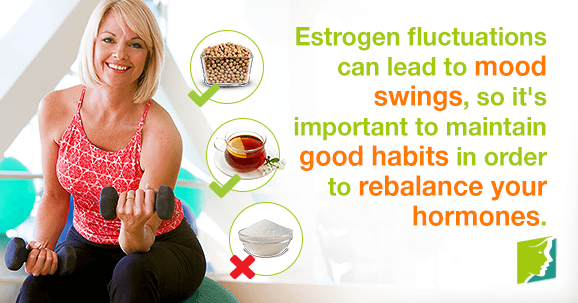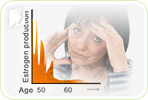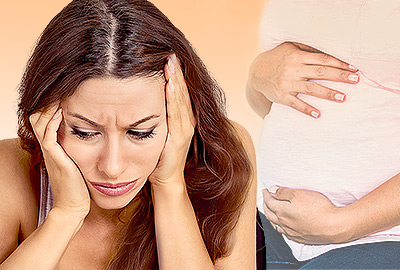Mood swings are a fairly common menopausal symptom, and can vary greatly in severity. In their worst form, they can cause sudden drastic changes in mood that leave you with emotional whiplash. These mood swings are caused by imbalances and fluctuations in hormones during menopause.
What Are Sex Hormones?
Menopause is the flip-side of puberty. Much as puberty caused hormonal changes that led to the menstrual cycle, acne, and developing an adult body, during menopause, many of those essential hormone levels decrease. This leads to a loss of periods, mood swings, and a redistribution of weight. There are three main hormones that are involved in this process: estrogen, progesterone, and testosterone.
Estrogen
Estrogen is a group of female sex hormones secreted by the ovaries. The most common types are estriol, estradiol, and estrone. Estrogen hormones play an essential role in the reproductive system and influence secondary sex characteristics - promoting extra fat deposits around the hips and thighs or producing extra collagen, for example.
Progesterone
Progesterone, formed by the corpus luteum and placenta, is responsible for preparing the uterus for pregnancy, as well as maintaining the mammary glands.
Testosterone
Testosterone, a male hormone, is generally produced by the testicles in men, and by the adrenal glands in both men and women. It affects sexual development.
How Do Sex Hormones Influence Your Mood?
While these hormones are important for healthy sexual and reproductive function, they also have a great many other functions. Particularly estrogen, which has an effect on your skin, vaginal tissue, bones, heart and more. It also has an important effect on your brain, boosting memory, improving processing, and affecting mood. Decreased estrogen can lead to decreased serotonin, the so called “happiness chemical" secreted by the brain. Insufficient amounts of serotonin can lead to anxiety and depression. When levels of estrogen fluctuate, this can also inadvertently cause your serotonin levels to fluctuate, leading to mood swings.
Ironically, a postmenopausal woman may have less estrogen than a man of the same age, since some of the testosterone produced in the testicles is converted into estrogen.
What Can You Do about it?
There are a number of options for treating mood swings and rebalancing your hormones, including:
- A healthy lifestyle. A moderately intense cardio session can help produce extra serotonin and endorphins. Likewise, avoiding refined sugars can help keep blood sugar levels stable, and lead to less fluctuation in hormone levels.
Alternative medicines. Phytoestrogenic herbs, such as soy or black cohosh, can often replicate the effects of estrogen in the body. There are also some herbal remedies that stimulate hormonal glands to produce more hormones.
- Medical procedures. Options such as hormone replacement therapy (HRT) can also help regular hormones, although as with any medical procedure there are risks and benefits that you should discuss with your doctor.
If you are concerned about your mood swings or hormone levels, always talk to your doctor.
Sources
- Thacker, H.L. MD (2009) The Cleveland Clinic Guide to Menopause. Kaplan publishing, New York.




